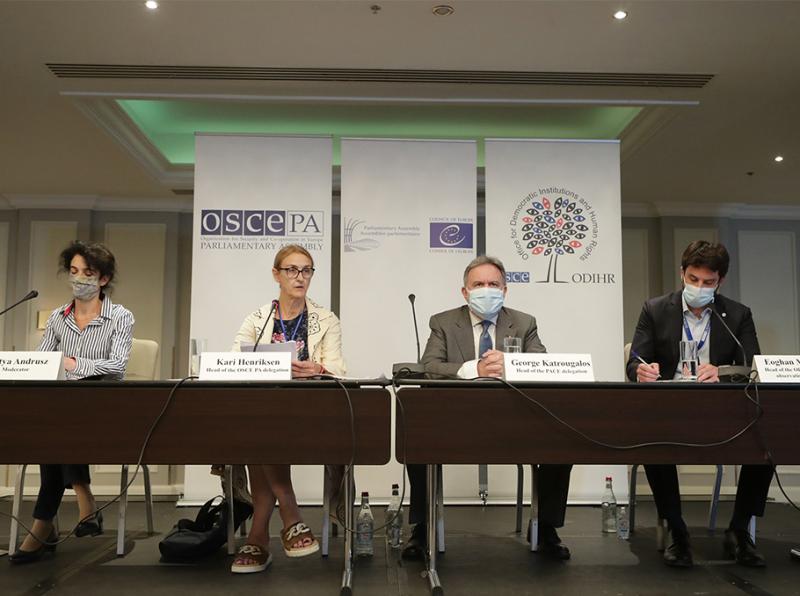
The 20 June 2021 early parliamentary elections in the Republic of Armenia were competitive and
generally well-managed within a short timeframe. However, they were characterized by intense
polarization and marred by increasingly inflammatory rhetoric among key contestants. The legal
framework is generally comprehensive, but the fact that amendments were adopted so close to the elections
caused some legal uncertainty. The election administration conducted its work in a transparent, collegial
and professional manner and enjoyed electoral stakeholders’ confidence. Voters were provided with a
broad range of options, and fundamental rights and freedoms were generally respected, with contestants
being able to campaign freely. However, the negative tone and the personality driven nature of the
campaign hindered a policy-focused debate. Generally, women were sidelined throughout the campaign.
Election day, including the vote count, was assessed positively overall.
The decision to hold early elections arose in the aftermath of anti-government protests following the
signing of a ceasefire statement with Azerbaijan. The ceasefire statement followed a 44-day war in and
around Nagorno-Karabakh. The elections took place in the context of continuing tension between Armenia
and Azerbaijan. National security issues dominated the political discourse, overshadowing debate on other
policy issues, and harsh rhetoric exacerbated an already polarized political environment.
The legal framework is broadly conducive to the conduct of democratic elections and provided
comprehensive regulation of most components of the electoral process despite some shortcomings. The
Electoral Code, adopted in 2016, was amended in April and May 2021, shortly before elections were
called. The changes had been publicly debated and advocated and were supported by most political parties
and civil society groups and public outreach on the proposed electoral reforms was largely perceived as
inclusive. However, the late adoption by parliament and the decision by the president not to sign the
amendments affected legal certainty and left limited time for implementing regulations and informing
voters on new procedures.
Following the elimination of open territorial lists in April, voters will elect a minimum of 101 MPs for a
five-year term, through a closed-list proportional system within a single nationwide constituency. In order
to qualify for the distribution of mandates, political parties had to obtain at least five per cent of votes cast,
with alliances of political parties required to obtain at least seven per cent of the vote. These thresholds
remain high for the stated aim of a purely proportional system. The law provides for up to four additional
reserved seats in parliament, one for each of the four largest national minorities (Yezidis, Russians,
Assyrians and Kurds).
Elections are administered by a three-tiered system comprising the Central Election Commission (CEC),
38 Territorial Election Commissions (TECs), and 2,008 Precinct Election Commissions (PECs). The CEC
conducted its work in a transparent, collegial and professional manner, meeting all legal deadlines, despite
a short time frame for preparations. Most IEOM interlocutors expressed confidence in the capacity of the
CEC to deliver on its mandate professionally. Some voiced apprehensions over the election
administration’s ability to maintain its independence. While TECs were assessed as generally professional
and open by ODIHR EOM observers, TEC decisions were not published online, nor were they uniformly
posted for public display, contrary to legal requirements. In keeping with the law, the PEC management
positions were distributed among the alliances in the outgoing parliament in proportion to their current
representation, hence providing a large majority of the positions to the ruling party. Women were well
represented in the PECs when compared to the CEC and the TECs where they represented only
approximately a third of the membership.
The voter register as of 13 June, included around 2.6 million eligible citizens, including a significant
number of voters residing abroad who remain on the voter register because they maintain an official
residence in Armenia. All citizens who are at least 18 years old on election day are eligible to vote, unless
convicted of a serious crime or declared mentally incompetent by a court decision. Deprivation of the right
to vote on the basis of a mental disability is inconsistent with international standards. In line with the law,
voter lists were made available for public scrutiny, and voters were able to request corrections. IEOM
interlocutors were satisfied with the level of transparency and expressed no concerns with the accuracy of
the voter register. The CEC is required to publish scanned copies of the signed voter lists from all polling
stations by 22 June. While international standards and best practices recommend the protection of data
privacy and the maintenance of secrecy when it comes to the participation of individual voters, all ODIHR
EOM interlocutors expressed support for this measure as an effective way to enhance transparency and
prevent electoral fraud.



